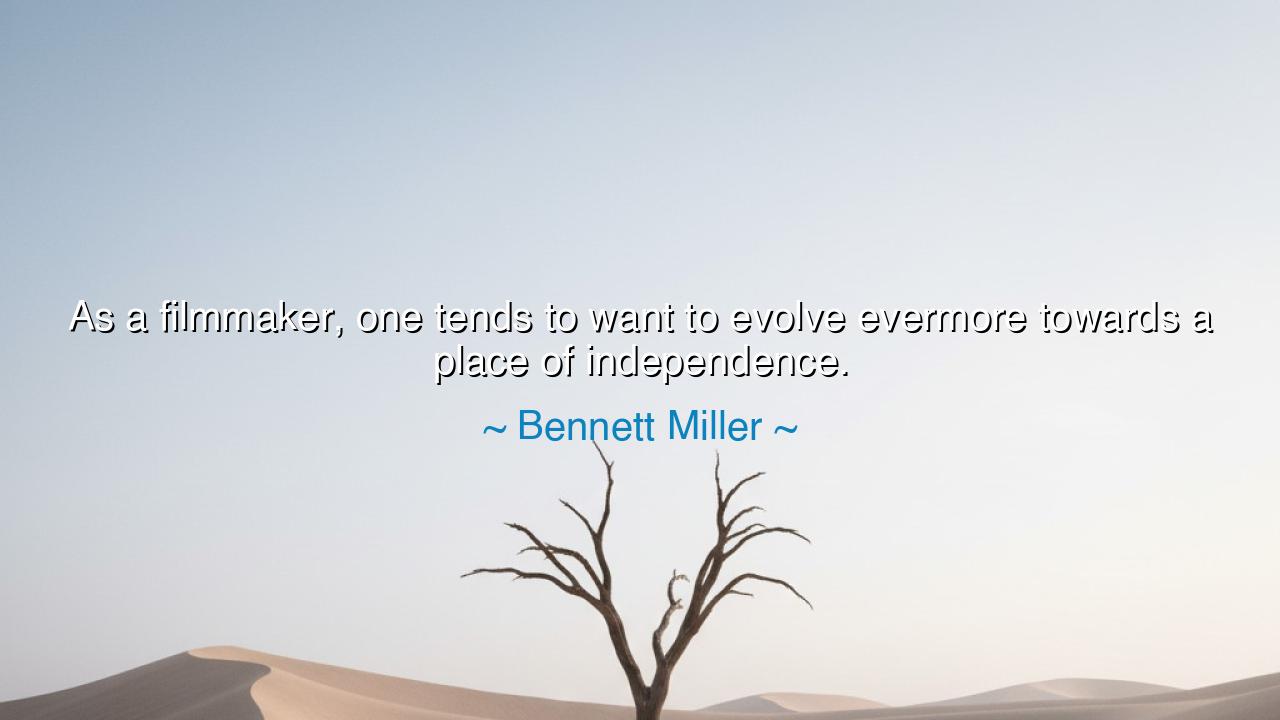
As a filmmaker, one tends to want to evolve evermore towards a






“As a filmmaker, one tends to want to evolve evermore towards a place of independence.” Thus spoke Bennett Miller, the artist behind films such as Capote and Foxcatcher, whose words rise beyond cinema to speak to the eternal journey of every creator, every seeker, every soul striving for freedom. His reflection, though framed in the world of film, carries the ancient wisdom of self-mastery — that independence is not merely a condition of circumstance, but a state of spirit. To “evolve evermore” toward it is to pursue truth itself: the liberation of one’s voice from the noise of the world.
To understand his meaning, one must first see the path of the artist. When the young creator begins, they are often bound by others — by money, by approval, by the towering expectations of society. They must please before they can create freely; they must obey before they can lead. Yet as time passes, the artist feels an inner pull, a longing to shed those chains and speak with their own unfiltered vision. This is the evolution Miller speaks of: not the rejection of collaboration, but the refinement of one’s voice until it stands alone, honest and unyielding. For true art — like truth itself — can only emerge when the artist becomes independent, beholden not to masters, but to meaning.
The ancients knew this journey well. In the age of Greece, the sculptor Phidias labored under the patronage of kings and temples, yet his heart burned for perfection beyond commission. When he carved the statue of Zeus at Olympia, he did not simply fulfill a task; he gave form to his own reverence for the divine. So too does the modern filmmaker strive not just to entertain, but to reveal. Every great artist, from the painter in his garret to the composer at his piano, faces the same choice: to serve the will of others, or to pursue the call of their own inner law. And though the world rewards the obedient, it immortalizes the independent.
Bennett Miller himself is a man of quiet conviction, known for crafting films that delve into the human soul with precision and restraint. He speaks not of rebellion, but of ascension — the gradual process by which the artist learns to trust intuition over instruction. His words recall the path of Stanley Kubrick, who began his career working under studio constraints yet fought ceaselessly to gain creative control. In time, Kubrick achieved that sacred independence, producing works that were not dictated by the marketplace, but guided by vision — 2001: A Space Odyssey, A Clockwork Orange, Barry Lyndon. Such works endure not because they were safe, but because they were free. Independence, Miller reminds us, is not the absence of limitation, but the courage to face those limitations with authenticity.
But this truth extends beyond the artist’s realm. Every human being is a filmmaker of their own life, framing the story of their days through the choices they make. To “evolve towards independence” is the calling of all souls who wish to live with purpose. Dependence — on approval, on comfort, on conformity — dulls the spirit and blinds the heart. Independence, by contrast, demands courage, for it means standing alone when others follow, and believing in one’s vision even when it is doubted. It is the fire that burns away imitation, leaving only the pure flame of selfhood.
Consider the story of Galileo, who looked through his telescope and saw what no one wished to see — that the Earth was not the center of the cosmos. For this truth, he faced condemnation, yet he did not abandon it. In choosing intellectual independence over obedience, he laid the foundation for modern science. His courage, like Miller’s philosophy, teaches that evolution is not the act of changing one’s surroundings, but of strengthening one’s will. To evolve toward independence is to align with truth, even when the world prefers illusion.
So, my child of creation and courage, take this lesson from Bennett Miller’s words: seek your independence, but not through defiance — through growth. Do not reject guidance, but outgrow it. Let the wisdom of others be your foundation, but let your own voice be the tower that rises above it. For the destiny of every artist, every thinker, every human soul is the same: to reach that moment when you no longer ask permission to create, to speak, to be.
And when you arrive at that sacred place — when you stand alone with your craft, your vision, your truth — know that you have touched the divine. For independence is not a solitary state, but a communion with the eternal, where creation flows not from fear, but from freedom. Then, and only then, will your work — and your life — bear the unmistakable mark of authenticity.






AAdministratorAdministrator
Welcome, honored guests. Please leave a comment, we will respond soon